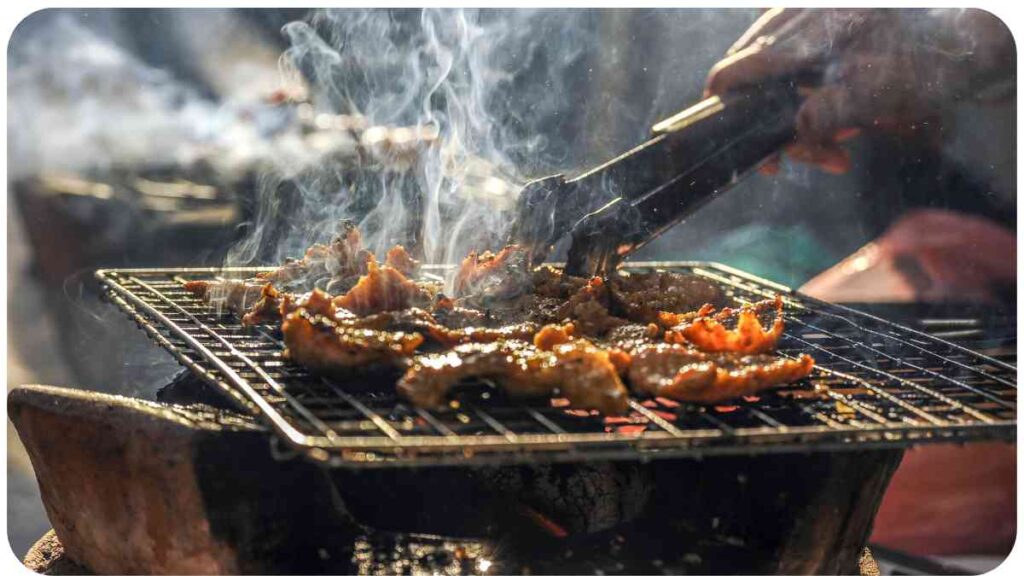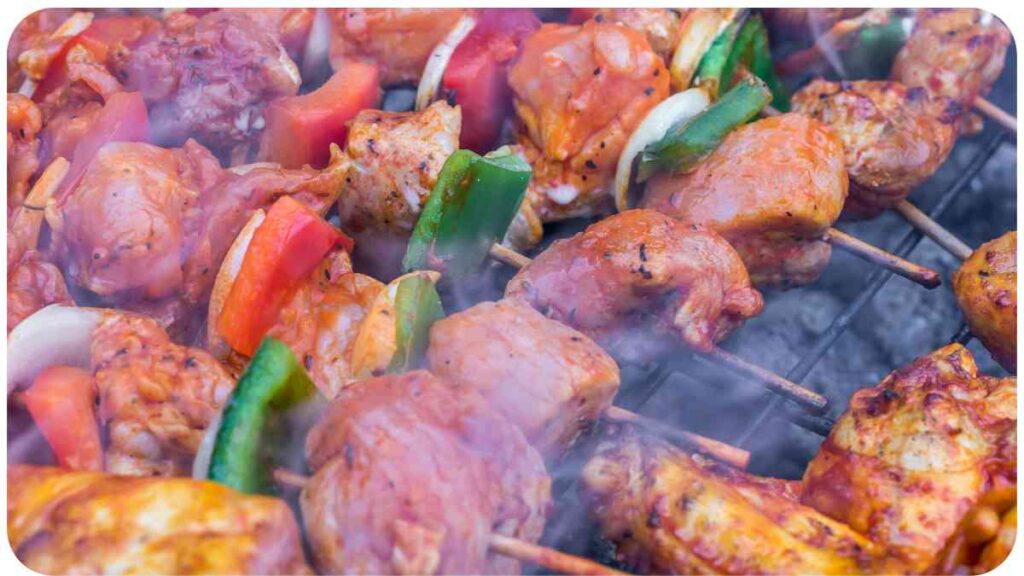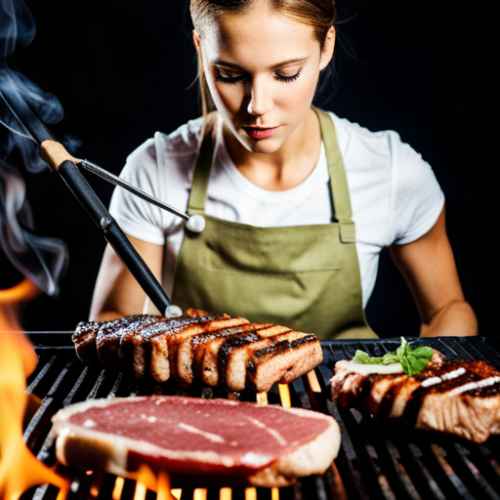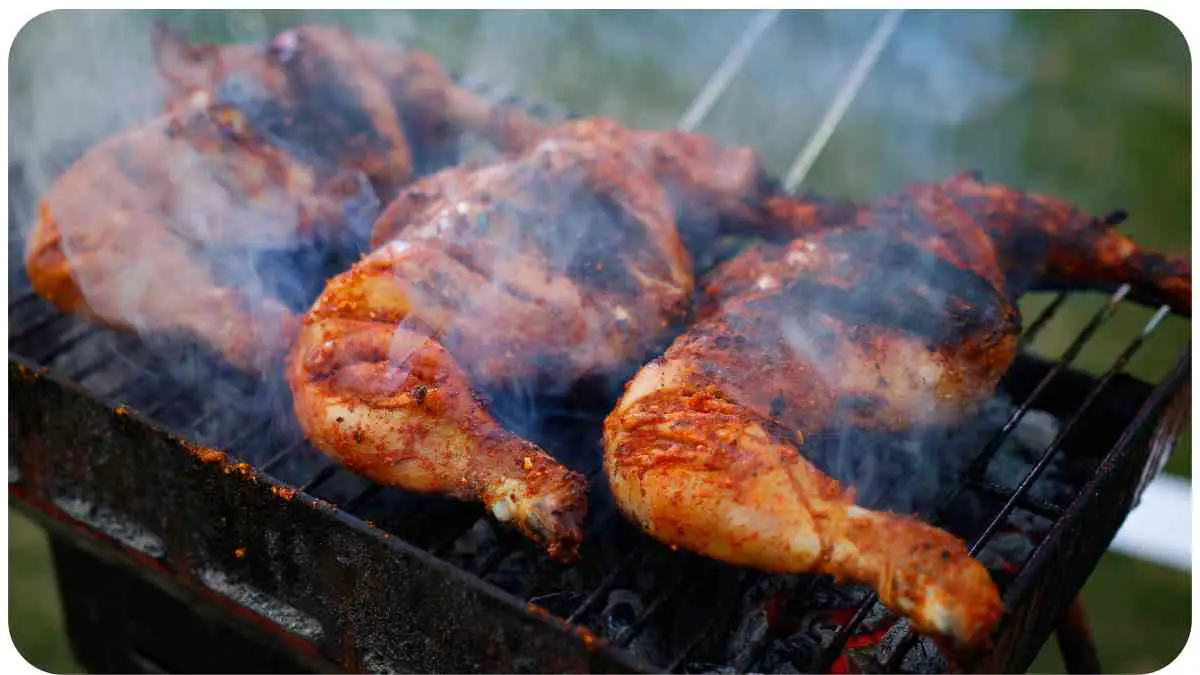Welcome to this comprehensive guide on tackling one of the most common issues faced by grill enthusiasts: excessive smoke from your Broil King grill. As someone who’s spent years honing my skills around the grill, I understand how frustrating it can be when your cooking experience is hindered by thick clouds of smoke.
In this article, we’ll dive deep into the reasons behind this issue and equip you with expert tips and actionable solutions to enjoy a smoke-free grilling adventure. Whether you’re a seasoned grill master or a novice, rest assured that you’ll find valuable insights to enhance your grilling journey.
| Takeaways |
| Excessive smoke from your Broil King grill can impact flavor. |
| Grease buildup, drippings ignition, and poor airflow are causes. |
| Regular cleaning and maintenance are vital for smoke prevention. |
| High-quality fuel and proper seasoning help reduce smoke. |
| Troubleshoot step by step and seek professional help if needed. |
| Wood chips enhance flavor, but use them properly to avoid smoke. |
| Optimal preheating and temperature control minimize smoke. |
2. Understanding Grill Smoke: A Quick Overview
Before we jump into the reasons for excessive smoke, let’s quickly explore the basics. Grill smoke is an essential aspect of outdoor cooking, adding rich flavors to your dishes. However, when smoke becomes excessive, it can negatively impact both the taste of your food and your overall grilling experience.
Excessive smoke can stem from various factors, ranging from grease buildup to airflow problems. Identifying and addressing these issues will ensure that your grill performs optimally and delivers delicious results every time.
When it comes to maintaining your grill, following the Dos and Don’ts is crucial. Avoid common mistakes and ensure your grill stays in top-notch condition for the perfect grilling experience.
3. Common Causes of Excessive Smoke
3.1. Grease Buildup
Grease buildup is a leading culprit behind excessive smoke. Over time, grease and food particles accumulate on the grill grates and other components. When exposed to high heat, these residues produce smoke that can overpower the flavors of your dishes. Regular cleaning of your grill’s interior and exterior is crucial to prevent this buildup and maintain consistent performance.
| Table 3.1: Grease Buildup Prevention |
| Steps |
| Clean grates after each use |
| Scrape grease tray and drip pan |
| Deep clean interior components |
3.2. Drippings Ignition
Another common cause of excessive smoke is the ignition of drippings and residue in the grill. When these drippings come into contact with the flames or heating elements, they can flare up and create smoke.
To prevent this, regularly inspect and clean the drippings tray, as well as the areas around the burners or heating elements. Keeping these areas free from debris will reduce the chances of drippings causing smoke.
| Table 3.2: Drippings Ignition Prevention |
| Steps |
| Empty and clean drippings tray |
| Inspect burners and heating elements |
| Remove debris and residue from burner area |
3.3. Airflow Issues
Proper airflow is essential for maintaining a controlled grilling environment. Insufficient airflow can lead to inefficient combustion, resulting in excessive smoke. Check vents, dampers, and any air intake areas to ensure they are open and functioning correctly. Additionally, avoid crowding the cooking surface with food, as this can impede airflow.
Grill enthusiasts know that cleaning your grill is as vital as the cooking process. Discover why proper cleaning practices are essential for the longevity and performance of your grill.
| Table 3.3: Airflow Optimization |
| Steps |
| Clean and open vents and dampers |
| Avoid overcrowding the grill |
| Position grill in a well-ventilated area |
3.4. Poor-Quality Fuel
The type and quality of fuel you use can significantly impact smoke production. Subpar charcoal or damp wood chips can result in excessive smoke. Opt for high-quality, well-seasoned fuel sources to minimize smoke output. If you’re using a gas grill, make sure the propane or natural gas supply is consistent and clean to ensure efficient combustion.
| Table 3.4: Fuel Quality and Selection |
| Type of Grill |
| Charcoal Grill |
| Gas Grill |
| Wood Pellet Grill |
4. Expert Tips for Preventing Excessive Smoke

Now that we’ve explored the common causes of excessive smoke, let’s delve into some expert tips to prevent and mitigate this issue for a seamless grilling experience.
4.1. Regular Cleaning and Maintenance
A clean grill is a happy grill. Regularly clean your grill’s grates, interior components, and exterior surfaces. This not only prevents grease buildup and drippings ignition but also ensures optimal airflow for efficient combustion. A well-maintained grill is less likely to produce excessive smoke and imparts better flavors to your food.
Keep your grill in peak performance with the help of The Ultimate Grill Maintenance Checklist. Follow this comprehensive guide to ensure your grill is ready for every barbecue session, avoiding unexpected issues.
| Table 4.1: Cleaning and Maintenance Schedule |
| Component |
| Grates, burners, and heat deflectors |
| Grease tray and drip pan |
| Interior deep clean (removing parts if needed) |
4.2. Preheating and Adjusting Temperature
Proper preheating is essential to reduce initial smoke production. Preheat your grill with the lid closed to allow any residual debris to burn off. Once preheated, adjust the temperature based on your cooking needs. Cooking at the right temperature not only minimizes smoke but also ensures even cooking and a delicious end result.
| Table 4.2: Preheating and Temperature Adjustment |
| Step |
| Preheat with lid closed |
| Adjust temperature based on cooking needs |
4.3. Using High-Quality Fuel
Invest in high-quality fuel sources to reduce smoke output. Whether you’re using charcoal, gas, or wood pellets, choose reputable brands that offer clean and consistent burning. Using the right fuel ensures efficient combustion, which in turn results in less smoke and more flavorful dishes.
| Table 4.3: Recommended Fuel Brands |
| Fuel Type |
| Charcoal |
| Gas (Propane/Natural Gas) |
| Wood Pellets |
4.4. Properly Seasoning the Grill Grates

Seasoning your grill grates not only prevents food from sticking but also contributes to reduced smoke production. Before grilling, brush the grates with a high smoke point oil (such as canola or grapeseed oil) and preheat the grill for about 15 minutes. This creates a non-stick surface and minimizes the chances of excessive smoke.
Grilling is an art, but avoiding common grilling mistakes is a science. Learn how to enhance your grilling skills by steering clear of common errors that might affect the taste and quality of your barbecue.
| Table 4.4: Grill Grate Seasoning |
| Step |
| Brush grates with high smoke point oil |
| Preheat grill for about 15 minutes |
5. Troubleshooting Excessive Smoke: Step-by-Step
In this section, we’ll provide a step-by-step guide to troubleshoot and address excessive smoke issues. Follow these steps to identify the root cause of the problem and implement effective solutions.
5.1. Step 1: Check for Grease Buildup
If you notice excessive smoke during grilling, the first step is to inspect the grill for any grease buildup. Excess grease on the grates, burners, and interior components can lead to smoke production. Clean the grates and components thoroughly before using the grill.
| Table 5.1: Grease Buildup Troubleshooting |
| Steps |
| Inspect grates, burners, and interior |
| Clean grates, burners, and interior |
5.2. Step 2: Inspect Drippings Tray and Ignition
Excessive smoke can also result from ignition of drippings and debris in the drippings tray. Inspect the tray for buildup and clean it as needed. Additionally, check the ignition system to ensure it’s functioning properly.
| Table 5.2: Drippings Tray and Ignition Inspection |
| Steps |
| Empty and clean drippings tray |
| Inspect ignition system |
5.3. Step 3: Ensure Proper Airflow
Inadequate airflow can lead to inefficient combustion and excessive smoke. Check vents, dampers, and air intake areas to ensure they are open and unobstructed.
Unlock the secrets behind achieving the perfect grilled steak on a Traeger Grill. Explore the science behind the process and elevate your grilling game with insights into the techniques that result in a mouthwatering Traeger-grilled steak.
| Table 5.3: Airflow Troubleshooting |
| Steps |
| Inspect vents and dampers |
| Verify unobstructed air intake areas |
5.4. Step 4: Evaluate Fuel Source
Poor-quality or damp fuel can contribute to excessive smoke. Ensure you’re using high-quality, dry fuel sources that are appropriate for your grill type.
| Table 5.4: Fuel Source Evaluation |
| Steps |
| Check fuel quality and dryness |
| Verify compatibility with grill type |
6. When to Seek Professional Help
While these troubleshooting steps can resolve many smoke-related issues, there may be instances where seeking professional help is the best course of action. If you’ve followed all the recommended steps and the problem persists, it’s advisable to contact a certified grill technician. They can diagnose complex issues, perform advanced maintenance, and ensure your grill is operating safely and efficiently.
7. Frequently Asked Questions (FAQs)
7.1. Can excessive smoke affect the flavor of food?
Absolutely. Excessive smoke can overpower the natural flavors of your dishes, leading to an undesirable taste. By addressing the root causes of smoke production, you can enjoy better-tasting grilled meals.
7.2. How often should I clean my grill?
Regular cleaning is essential to prevent excessive smoke. Clean the grates after each use, empty the drippings tray monthly, and perform a deep clean at least once a season.
7.3. Can I use wood chips for added flavor?
Certainly! Wood chips can add delightful smoky flavors to your food. Soak them in water before use to prevent them from producing excessive smoke and ensure a balanced flavor profile.
8. Grilling Anecdotes: Learning from Real Experiences
In my years of grilling, I’ve encountered my fair share of smoke-related challenges. One memorable instance involved a buildup of residue in the drippings tray, causing unexpected flare-ups and smoke. By cleaning the tray and ensuring proper airflow, I quickly resolved the issue and continued grilling mouthwatering steaks for a delightful dinner.
9. Conclusion
Grilling is an art that combines expertise, experience, and a touch of creativity. Excessive smoke can put a damper on this artistry, but armed with the insights and tips shared in this guide, you’re well-equipped to conquer this challenge. Remember to prioritize regular cleaning, optimal airflow, and high-quality fuel sources. By taking these steps, you’ll not only reduce smoke production but also elevate your grilling game to new heights. Enjoy your smoke-free culinary adventures!
Further Reading
For more in-depth information on dealing with excessive smoke issues and enhancing your grilling experience, check out these helpful resources:
- Grillers Spot: Why Does My BBQ Make Too Much Smoke? Short Description: Explore common reasons behind excessive smoke from your barbecue and discover practical solutions to minimize smoke production.
- The Spruce Eats: Fixes for Common Gas Grill Problems Short Description: Learn about various issues that can arise with gas grills and find expert advice on troubleshooting and fixing these problems, including excessive smoke.
- Griddle King: Why Does My Propane Grill Smoke So Much? Short Description: Dive into the reasons why propane grills might produce excess smoke and explore effective strategies to address and prevent this issue.
FAQs
How can excessive smoke affect the flavor of grilled food?
Excessive smoke can overpower the natural flavors of your dishes, resulting in an undesirable and overly smoky taste.
Is it safe to use wood chips for grilling?
Yes, using wood chips can enhance the flavor of your food. Soak the wood chips in water before use to prevent excessive smoke and ensure a balanced smoky flavor.
How often should I clean my grill?
Regular cleaning is crucial to prevent excessive smoke. Clean the grates after each use, empty the drippings tray monthly, and perform a deep clean at least once a season.
Can I use charcoal in a gas grill?
No, it’s not recommended to use charcoal in a gas grill. Gas grills are designed to work with propane or natural gas. Using charcoal can lead to safety hazards and damage to the grill.
Why does my grill produce more smoke when using a specific type of fuel?
Different types of fuel can produce varying amounts of smoke. Make sure you’re using high-quality, well-seasoned fuel that is appropriate for your grill type to minimize smoke production.

Hi there! I’m Hellen James, and I’m a grilling enthusiast. I’ve been grilling for years, and I absolutely love it. I love how it brings people together and how you can feed your family with just a few minutes of work.

